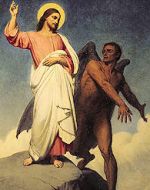Catholic Dictionary
Find accurate definitions of over 5,000 Catholic terms and phrases (including abbreviations). Based on Fr. John Hardon's Modern Catholic Dictionary, © Eternal Life. Used with permission.
Random Term from the Dictionary:
SPINOZISM
Philosophy of Benedict de (Baruch d'Espinoza) Spinoza (1632-77), of Amsterdam. Because of his unorthodox ideas he was excommunicated from the Jewish synagogue. Spinozism holds that all existence is embraced in one substance, which is God or nature. On this premise it follows that mind and matter, time, and in fact everything that seems to be real is only a manifestation of the One Reality, who (or which) alone exists. Evil, whether physical or moral, exists only for finite minds and dissolves when seen as part of the divine Whole. It is not clear how Spinoza saw finite things as somehow emanating from the infinite. He held that the one divine substance becomes conscious in the infinite multiplicity of attributes. Spinozism is commonly regarded as the most thoroughgoing form of monistic idealism, and was the first of the three principal forms of pantheism condemned by the First Vatican Council.



